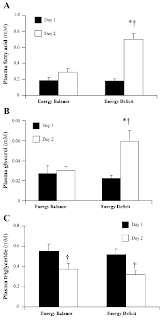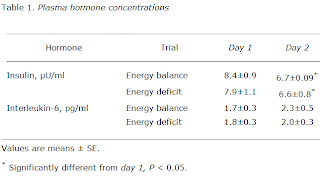Energy deficit w/o LC alters resting carb oxidation and FA availability
Originally lucky post #13 made on March 23, 2010
Energy deficit without reducing dietary carbohydrate alters resting carbohydrate oxidation and fatty acid availability
In light of all of the "fat burning" , respiratory quotient and mitochondrial mayhem discussions of damaged metabolisms, I thought this might be a fitting post to bump to the top today. The take home message of this study, IMO, is that the body burns what it needs to burn, and hormone levels adjust accordingly, not so much the other way around.
Reduced carbohydrate (CHO) availability after exercise has a potent influence on the regulation of substrate metabolism, but little is known about the impact of fat availability and/or energy deficit on fuel metabolism when dietary CHO availability is not reduced. The purpose of this study was to determine the influence of a postexercise energy deficit, independent of CHO availability, on plasma substrate concentrations and substrate oxidation.
Seven moderately trained men (peak oxygen uptake: 56 ± 2 ml·kg–1·min–1) performed exhaustive cycling exercise on two separate occasions. The two trials differed only by the meals ingested after exercise: 1) a high-fat diet designed to maintain energy balance or 2) a low-fat diet designed to elicit energy deficit. The CHO and protein contents of the diets were identical. The next morning, we measured plasma substrate and insulin concentrations and CHO oxidation, and we obtained muscle biopsies from the vastus lateralis for measurement of pyruvate dehydrogenase kinase (PDK)-2 and PDK-4 mRNA expression by using RT-PCR.
Despite identical blood glucose (5.0 ± 0.1 and 4.9 ± 0.1 mM) and insulin (7.9 ± 1.1 and 8.4 ± 0.9 µU/ml) concentrations, plasma fatty acid and glycerol concentrations were elevated three- to fourfold during energy deficit compared with energy balance and CHO oxidation was 40% lower (P < 0.01) the morning after energy deficit compared with energy balance (328 ± 69 and 565 ± 89 µmol/min). The lower CHO oxidation was accompanied by a 7.3 ± 2.5-fold increase in PDK-4 mRNA expression after energy deficit (P < 0.05), whereas PDK-2 mRNA was similar between the trials.
In conclusion, energy deficit increases fatty acid availability, increases PDK-4 mRNA expression, and suppresses CHO oxidation even when dietary CHO content is not reduced.
The theory part of this article is fairly lay-person friendly so I encourage reading it.
I found this very interesting. I only wish they had added a third meal for comparison -- that being a high fat/low carb energy deficit diet.
Each phase of the study lasted 2 days. They got a standard meal to eat for dinner the night before the study. On Day 1 resting data was collected, they exercised to exhaustion, and were then given a diet to be eaten in 3 equal portions afterwards. The study diet consisted of 1.1g/kg protein and 5g/kg carbohydrate, ~165g fat was added to the energy balance "high fat" diet, while the energy deficit diet contained ~1500 cal less. Resting data was collected on Day 2.
This study demonstrates that the energy deficit, independent of carb ingestion, dramatically alters the post exercise response of energy substrate usage. And this was over a 24 hour period. Here are the plasma lipid levels (click on the pic to enlarge):
The increased glycerol and NEFA/FFA are the result of increased lipolysis of endogenous (body!) fat. Interestingly enough, the insulin was reduced from Day 1 but the same in both groups. Changes in IL-6 were not statistically significant although they do seem to trend up and become more variable in that energy balance group.
And lastly, the carbohydrate and fat oxidation rates:
*Significantly different from energy balance trial, P < 0.05.
{dagger}Significantly different from day 1, P < 0.05.
So exercising to exhaustion changed energy substrate usage (daggers indicate stat.sig. differences from Day 1) in both groups. Carb oxidation is reduced while fat oxidation increases. The fat oxidation increaase is greater in the energy deficit group!!
Now these men weighed ~76 kg so both diets contained >300g carbohydrate! An amount that Taubesians would presume sends insulin levels through the roof, locks fat into our cells and should send blood glucose levels and triglycerides through the roof.
From the Discussion :
An acute energy deficit triggers essential metabolic alterations to mobilize endogenous lipids and preserve endogenous carbohydrate when exogenous energy availability is low (2, 26). However, because carbohydrate availability provides a potent influence on substrate selection, it is often very difficult to distinguish between the effects of energy deficit and carbohydrate restriction. The major finding of this study was that, without reducing dietary carbohydrate availability, an exercise-induced energy deficit increased plasma fatty acid concentration and suppressed carbohydrate oxidation. Moreover, compared with an exercise-induced energy deficit, maintaining energy balance by ingesting extra dietary fat after exercise (without changing dietary carbohydrate content) prevented the rise in plasma fatty acid concentration and attenuated the decline in carbohydrate oxidation the next morning.
Exercise-induced energy deficit is known to suppress carbohydrate oxidation (1, 40). However, because the human body is keenly sensitive to alterations in dietary carbohydrate, much of this effect has been attributed to the reduction in dietary carbohydrate and the resultant low liver and muscle glycogen resynthesis, rather than the negative energy balance. Providing identical carbohydrate content during energy deficit and energy balance in our study enabled us to differentiate between the effects of energy deficit and the known potent influence of alterations in dietary carbohydrate (8, 16, 43). This study is the first to demonstrate that preventing energy deficit after exercise by ingesting extra dietary fat attenuated the reduction in carbohydrate oxidation. Interestingly, this attenuation in carbohydrate oxidation the day after exercise was found despite identical plasma insulin and glucose concentrations during energy deficit and energy balance. Furthermore, in a companion study to this project using these same subjects (13), we found that adding extra dietary fat to meals after exercise did not affect muscle glycogen resynthesis. These findings indicate that the reduction in carbohydrate oxidation during energy deficit is not solely dependent on plasma insulin concentration or endogenous and exogenous carbohydrate availability, but that it can respond to dietary fat and/or energy availability, per se.
Now this study was done in moderately trained, healthy, young (~30y) men. But this does demonstrate that insulin is not the be all and end all of fat burning. The energy deficit increased the relative changes in substrate oxidation (carb down, fat up).



Comments
Sorry, I'm tired at the moment :P
I've been doing a bit of research and so far but am struggling to come to a conclusion.
Have you run across this in your research?
Fatmax: A New Concept to Optimize Fat Oxidation During Exercise?
http://edulife.com.br/dados%5CArtigos%5CEducacao%20Fisica%5CFisiologia%20do%20Exercicio%5CFatmax%20A%20New%20Concept.pdf
And a study using the Fatmax concept:
http://www.jssm.org/vol7/n4/3/v7n4-3text.php
The 180-Formula and Heart-Rate Monitoring
http://philmaffetone.com/180formula.cfm
If you are a runner, you might find this forum useful:
http://www.runningahead.com/groups/LOWHRTR/forum
If it is an activity that you enjoy, or at least find tolerable, then you are more like to persevere through that "Not again!" stage and continue to the point where you are getting real benefits. If it is an activity that you dislike, you are going to make excuses to skip it today (and tomorrow, and the day after, and the day after that).
It is all the rage these days to say you HAVE to sprint, you HAVE to deadlift, etc., but for the vast majority of people that is a recipe for failure, because most people will give up on it after a few weeks, and would have been better off simply walking.
https://www.youtube.com/watch?feature=player_embedded&v=qX9FSZJu448#!
Bravo, Arthur!
He has an interview live at 9pm ET tonight (in one hour)... oh boy, it's a bad time for moderation to delay postings. More details in comment here:
http://suppversity.blogspot.com/2012/05/integrated-core-exercises-for-six-pack.html?showComment=1337212206325#c6026398010929789796
Kruse just replied to a question about greying hair on his blog with the following. Can anyone interpret this for me? Thanks!
Kruse: "greying means we have increased the speed of our circadian chemical clocks in our melanocytes in our hair follicle due to a pro growth terroir in those cells."
http://carbsanity.blogspot.ca/2012/05/quack-speaks.html?showComment=1336637879675#c7968704732068111837
UPDATE: I've discovered sacrificing 99 virgins[0] to the love child of Cthulhu, Jehovah, Aphrodite & दुर्गा (Durgā) at the foothills of the Mountains of Madness you may get a glimpse into Jack's psyche [1].
[0] all must be muscular human males over age 50
[1] and when you do you'll slap your head & think "fried cr*p on a popsicle stick .. that's it?"
Probably depends on your location's demographics, and the demographic the clubs are selling to.
Big weights, safety racks and associated accoutrements are an afterthought hereabouts ... it's all treadmills, stationary bikes, weight machines & aerobics.
I never, ever "got" the stationary bike thing. Not even racing rollers, mind you ...
I understand Toronto winters are hard to take on a bicycle outdoors but the summers are awesome, the drivers seem the most aware (often providing an entire lane to a wobbly bike.
This is exactly what can put people off. People may not want to and if they feel they have to it's not going to be fun.
That statement is in Krusian, which is a language no one could ever understand.
I don't think much can be taken from this study for the aforementioned reason. The better study population would have been obese people with chronically high levels of insulin. Testing fat and carb oxidation on metabolically healthy men with intake endocrine systems does not say much about obesity and how to lose fat.
I think calories count for weight loss but you need to get your hormones back into check before a calorie deficit matters. I was a big believer in Taubes a few years ago but now I find myself believing both "sides." I think it is a combination of both! I think insulin matters and I think calories matter too. In any event, I am a newcomer here and look forward to learning!
Taubes' more recent take home message -- that if you can't lose weight eating virtually no carbs then you're as thin as your damaged metabolism will allow you to be -- is needlessly despairing. So we have pictures coming back from the LC cruise sitting around chowing down on pounds of meat with perhaps a few veggies waiting for their metabolisms to heal BEFORE they can lose weight. And desperately trying to convince themselves that at least they're healthy.
So I hold out hope that what you read here will convince you otherwise. :D Most of the metabolic "damage" of obesity is due to a chronic energy surplus, or energy balance with way too much adipose tissue releasing fatty acids unrestrained. The obese who are hyperinsulinemic also tend to have elevated circulating free fatty acids and tend to have diminished ability to trap fat where it belongs.
Oh ... one last thought, nothing seems to lower insulin levels quite like exercise does. Which is just another nail in the coffin of Taubes' hypotheses.
Endurance training and obesity: effect on substrate metabolism and insulin sensitivity.
http://www.ncbi.nlm.nih.gov/pubmed/18379212
Effect of endurance training in type 2 diabetes
http://hal.archives-ouvertes.fr/docs/00/28/31/69/PDF/Article_S_Bordenave_Diabetes_Metab_Version_finale.pdf
Who counts this as a strikes[0]? Anyone sane?
[0] as long as you're not as bad as I used to be about my 10-speed. One GF told me it was either her or the bike. Wish I could say I miss her.
a great read. Thanks for sharing!
Also visit my page :: diet that works
Post a Comment
Comment Moderation is ON ... I will NOT be routinely reviewing or publishing comments at this time..